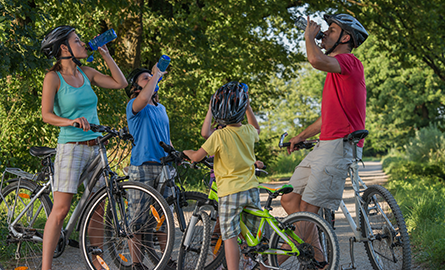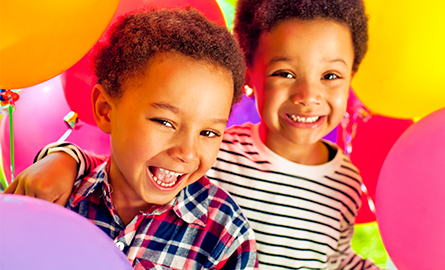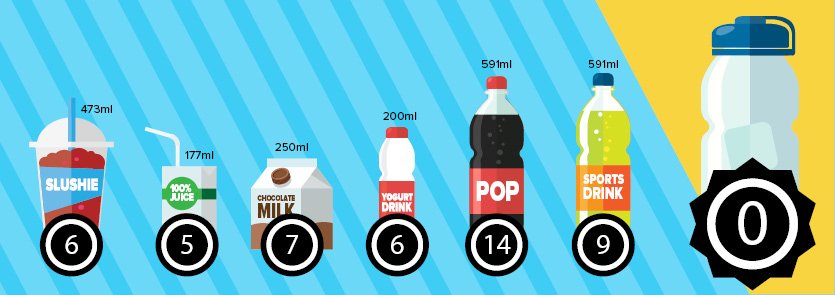Choose water
Choose water instead of sugary drinks
Many drinks, even those that appear to be healthy, are loaded with sugar. Sugary drinks make up the largest amount of sugar in childrens' diets. Sugary drinks bump out the good nutrients that kids need to be healthy, feel good and perform their best. Together as parents, we can make it easy for kids to choose water instead of sugary drinks.
Drinking too many sugary drinks is associated with cavities, heart disease, stroke, diabetes, and some cancers.
What are sugary drinks? |
Sugary drinks include:
Have you chosen juice, a sports drink, a yogurt drink, or a sweetened smoothie thinking it was a "healthier" choice? Many drinks are marketed as being "healthy", but are actually loaded with sugar. Knowing which drinks are high in sugar can help you make healthier choices for you and for your family.
|
Teaspoons of sugar in each drink
Note: Drink sizes and sugar content are approximate.
- Slushie (474 ml), 6 teaspoons of sugar
- 100% juice (177 ml), 5 teaspoons of sugar
- Chocolate milk (250 ml), 7 teaspoons of sugar
- Yogurt drink (200 ml), 6 teaspoons of sugar
- Pop (500 ml), 14 teaspoons of sugar
- Sports drink (591 ml), 9 teaspoons of sugar
- Water, 0 sugar
How do sugary drinks impact a child's health? |
|
Sugary drinks make up the largest amount of sugar in childrens' diets. Sugary drinks such as pop, juice, and sports drinks replace the healthy foods and drinks that children need to play, learn, and grow. |
Why is 100% fruit juice considered a sugary drink? |

Fruit juices, even those labelled 'no sugar added' or '100% juice', contain a lot of natural sugar. Drinking juice doesn't give the same feeling of fullness as eating whole fruit or vegetables. Whole fruit and vegetables give children important nutrients and added fibre, which will keep them feeling satisfied longer. |
Why is chocolate milk considered a sugary drink? |
 Chocolate milk has all the same nutrients as white milk, such as calcium and vitamin D; however, chocolate milk has added sugar. Plain unsweetened milk is a healthier choice to include with meals. Offer your child water throughout the day and with snacks. Chocolate milk has all the same nutrients as white milk, such as calcium and vitamin D; however, chocolate milk has added sugar. Plain unsweetened milk is a healthier choice to include with meals. Offer your child water throughout the day and with snacks. |
Why is vitamin-enhanced water a sugary drink? |
 Vitamin-enhanced water may look and sound like a healthy choice, but often have sugars added. Children will get the nutrients they need from healthy meals and snacks, so offer plain water instead. Check out our tips for reducing sugary drinks. Vitamin-enhanced water may look and sound like a healthy choice, but often have sugars added. Children will get the nutrients they need from healthy meals and snacks, so offer plain water instead. Check out our tips for reducing sugary drinks. |
How much should I limit sugary drinks to? |
|
Less is best. Many drinks, such as energy drinks, sports drinks, vitamin-enhanced waters, and fruit juice can have as much sugar as pop, so it's best to only have sugary drinks occasionally. Offer plain milk at meals and offer water most of the time throughout the day. |
Tips for parents to reduce sugary drinks |
|

During sports and events, make it easy for kids to choose water instead of sugary drinks by packing a water bottle with ice.

When packing your child's lunch, skip the sugary drinks and pack a reusable water bottle.

When heading out for the day, pack a reusable water bottle for all family members. Be a positive role model. Make water your drink of choice and your kids will too.

When planning a kids' birthday party, serve water instead of sugary drinks.













